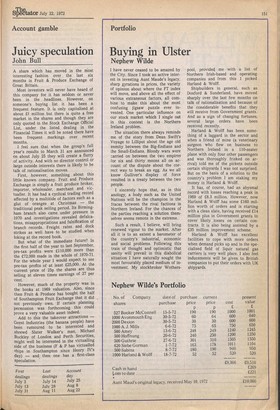Portfolio
Buying in Ulster
Nephew Wilde
I have never ceased to be amazed by the City. Since I took an active interest in investing Aunt Maude's legacy, sharp gyrations in prices, the variety of opinion about where the FT index will move, and above all the effect of various extraneous factors, all combine to make this about the most confusing jigsaw puzzle ever invented. One particular influence on our stock market which I single out in this context is the Northern Ireland problem.
The situation there always reminds me of the story from Dean Swift's Voyage to Lilliput about the age old enmity between the Big-Endians and the Small-Endians. Bloody wars were carried on between the two empires for six and thirty moons all on account of the dispute about the correct way to break an egg. As we all know Gulliver's display of force resulted in a treaty between the two people.
I sincerely hope that, as in this anology, a body such as the United Nations will be the champion in the fracas between the rival factions in Northern Ireland. For the chances of the parties reaching a solution themselves seems remote in the extreme.
Such a result, I believe, will bring renewed vigour to the market. After all it is to an extent a barometer of the country's industrial, economic and social problems. Following this train of thought and optimistic that sanity will prevail in this diabolical situation I have naturally sought the most favourably placed medium of investment. My stockbroker Wothers pool, provided me with a list of Northern Irish-based and operating companies and from this I picked Harland & Wolff.
Shipbuilders in general, such as Doxford & Sunderland, have moved sharply over the last few months on talk of rationalisation and because of the considerable benefits that they will receive from Government .grants. And as a sign of changing fortunes, several large orders have been received recently.
Harland & Wolff has been something of a laggard in the sector and when a friend of mine (a veterinary surgeon who flew on business to Northern Ireland in a 110-seater plane with only four other passengers and was thoroughly frisked on arrival) told me of the pickets outside certain shipyards I was not surprised. But on the basis of a solution to the country's problem I am staking my money in Harland & Wolff.
It has, of course, had an abysmal record with losses reaching a peak in 1969 of £8.3 million. However, now Harland & Wolff has some £160 million worth of orders and is starting with a clean slate, having received £14 million plus in Government grants to cover likely losses on certain contracts. It is also being assisted by a £35 million improvement scheme.
Harland & Wolff has excellent facilities to cope with more orders when demand picks up and in the specialised field of liquir natural gas carriers is very well place. I also feel inducements will be given to British companies to put their orders with UK shipyards.










































 Previous page
Previous page